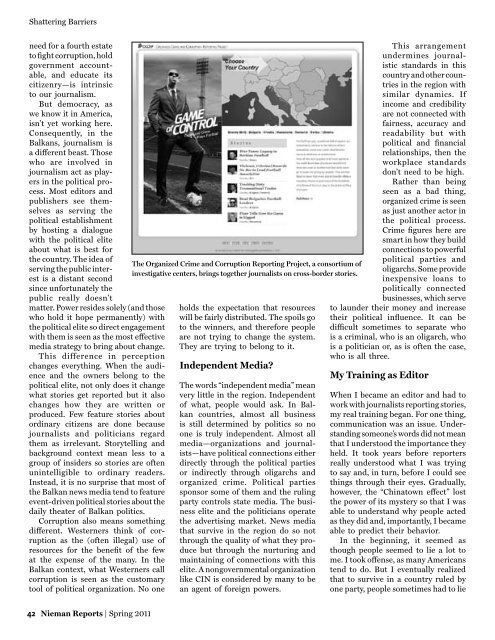N ieman Reports - Nieman Foundation - Harvard University
N ieman Reports - Nieman Foundation - Harvard University
N ieman Reports - Nieman Foundation - Harvard University
You also want an ePaper? Increase the reach of your titles
YUMPU automatically turns print PDFs into web optimized ePapers that Google loves.
Shattering Barriers<br />
need for a fourth estate<br />
to fight corruption, hold<br />
government accountable,<br />
and educate its<br />
citizenry—is intrinsic<br />
to our journalism.<br />
But democracy, as<br />
we know it in America,<br />
isn’t yet working here.<br />
Consequently, in the<br />
Balkans, journalism is<br />
a different beast. Those<br />
who are involved in<br />
journalism act as players<br />
in the political process.<br />
Most editors and<br />
publishers see themselves<br />
as serving the<br />
political establishment<br />
by hosting a dialogue<br />
with the political elite<br />
about what is best for<br />
the country. The idea of<br />
serving the public interest<br />
is a distant second<br />
since unfortunately the<br />
public really doesn’t<br />
matter. Power resides solely (and those<br />
who hold it hope permanently) with<br />
the political elite so direct engagement<br />
with them is seen as the most effective<br />
media strategy to bring about change.<br />
This difference in perception<br />
changes everything. When the audience<br />
and the owners belong to the<br />
political elite, not only does it change<br />
what stories get reported but it also<br />
changes how they are written or<br />
produced. Few feature stories about<br />
ordinary citizens are done because<br />
journalists and politicians regard<br />
them as irrelevant. Storytelling and<br />
background context mean less to a<br />
group of insiders so stories are often<br />
unintelligible to ordinary readers.<br />
Instead, it is no surprise that most of<br />
the Balkan news media tend to feature<br />
event-driven political stories about the<br />
daily theater of Balkan politics.<br />
Corruption also means something<br />
different. Westerners think of corruption<br />
as the (often illegal) use of<br />
resources for the benefit of the few<br />
at the expense of the many. In the<br />
Balkan context, what Westerners call<br />
corruption is seen as the customary<br />
tool of political organization. No one<br />
The Organized Crime and Corruption Reporting Project, a consortium of<br />
investigative centers, brings together journalists on cross-border stories.<br />
holds the expectation that resources<br />
will be fairly distributed. The spoils go<br />
to the winners, and therefore people<br />
are not trying to change the system.<br />
They are trying to belong to it.<br />
Independent Media?<br />
The words “independent media” mean<br />
very little in the region. Independent<br />
of what, people would ask. In Balkan<br />
countries, almost all business<br />
is still determined by politics so no<br />
one is truly independent. Almost all<br />
media—organizations and journalists—have<br />
political connections either<br />
directly through the political parties<br />
or indirectly through oligarchs and<br />
organized crime. Political parties<br />
sponsor some of them and the ruling<br />
party controls state media. The business<br />
elite and the politicians operate<br />
the advertising market. News media<br />
that survive in the region do so not<br />
through the quality of what they produce<br />
but through the nurturing and<br />
maintaining of connections with this<br />
elite. A nongovernmental organization<br />
like CIN is considered by many to be<br />
an agent of foreign powers.<br />
This arrangement<br />
undermines journalistic<br />
standards in this<br />
country and other countries<br />
in the region with<br />
similar dynamics. If<br />
income and credibility<br />
are not connected with<br />
fairness, accuracy and<br />
readability but with<br />
political and financial<br />
relationships, then the<br />
workplace standards<br />
don’t need to be high.<br />
Rather than being<br />
seen as a bad thing,<br />
organized crime is seen<br />
as just another actor in<br />
the political process.<br />
Crime figures here are<br />
smart in how they build<br />
connections to powerful<br />
political parties and<br />
oligarchs. Some provide<br />
inexpensive loans to<br />
politically connected<br />
businesses, which serve<br />
to launder their money and increase<br />
their political influence. It can be<br />
difficult sometimes to separate who<br />
is a criminal, who is an oligarch, who<br />
is a politician or, as is often the case,<br />
who is all three.<br />
My Training as Editor<br />
When I became an editor and had to<br />
work with journalists reporting stories,<br />
my real training began. For one thing,<br />
communication was an issue. Understanding<br />
someone’s words did not mean<br />
that I understood the importance they<br />
held. It took years before reporters<br />
really understood what I was trying<br />
to say and, in turn, before I could see<br />
things through their eyes. Gradually,<br />
however, the “Chinatown effect” lost<br />
the power of its mystery so that I was<br />
able to understand why people acted<br />
as they did and, importantly, I became<br />
able to predict their behavior.<br />
In the beginning, it seemed as<br />
though people seemed to lie a lot to<br />
me. I took offense, as many Americans<br />
tend to do. But I eventually realized<br />
that to survive in a country ruled by<br />
one party, people sometimes had to lie<br />
42 N<strong>ieman</strong> <strong>Reports</strong> | Spring 2011

















